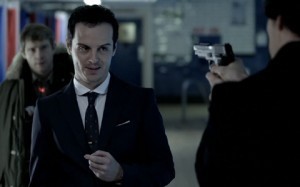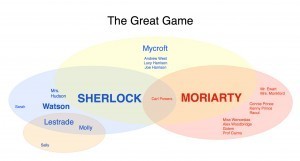Sherlock Sunday 2: The Great Game by Mark Gatiss (Antagonists)
As great antagonists go, Moriarty is right up there with Nemesis, almost as much a legend as Sherlock Holmes. What’s really interesting about Gatiss’s interpretation of him is that he’s the perfect doppelgänger antagonist. That is, Moriarty is Sherlock Holmes’s double: both sociopaths, both pursuing superiority in the abstract, each confident that he’s the smartest guy in the room, disdainful of everyone else as inferior to him. Sherlock acknowledges the kinship when Lestrade asks him why the Moriarty is playing his games, and he says, “I can’t be the only person in London who gets bored.” Moriarty acknowledges it, too, when he says, “We were made for each other.” The first puzzle Moriarty gives Sherlock, the death of Carl Powers, Sherlock describes as his first effort at professional detection and it’s implied that it’s Moriarty’s first murder. Even their self-designations of “consulting detective” and “consulting criminal” are mirror images, so that when Sherlock describes Moriary with a gleam in his eye as “something new,” he’s paying his respects to the evildoer who finally deserves his talents. Moriarty is certifiable, and Sherlock is pretty close to that; he’d be locked up for observation if it weren’t for an understanding landlady who doesn’t call the cops when he shoots holes in her wall and an exasperated brother who pretty much runs Britain. Holmes and Moriarty really are the same person for most of this episode.
Of course the only thing about that dynamic that’s interesting is if one of the players changes. John’s exasperation with Sherlock’s lack of empathy for the hostages finally breaks through at the end when Sherlock, face to face with Moriarty for the first time, says, “People died,” and Moriarty screams, “That’s what people do!”, an echo of Sherlock’s earlier assertion that people are in danger of dying all the time and he can’t be bothered by that. But Moriarty has gone too far, killing people for sport as part of his game, a line Sherlock won’t cross, and that makes Moriarty not Sherlock’s twin but his foil, the comparison that refutes Sally’s assertion that Sherlock is a psychopath. Moriarty is a psychopath; Sherlock just needs empathy lessons. And he gets them at the end when he sees John wrapped in explosives. His emotions are triggered and he reacts with carefully controlled rage, not because Moriarty has out-smarted him but because he’s put John in mortal danger and Sherlock cares. Not only that, John demonstrates that he’s willing to die to save Sherlock, something that stuns Sherlock, blasts him out of his self-absorption into the real world. It’s an epiphany that only someone crazier than Sherlock could have brought about, in part because Sherlock can see himself in the monster that is Moriarty. At the end, facing both Watson and Moriarty, Sherlock has to do what Mycroft told John to do: Pick a side. And he picks humanity over intelligence, real life over the game. It’s the end of the first season character arc for Sherlock, but only the set-up for the huge arc he’s going to be subjected to in the first episode of season two, and it fulfills one of the objectives of a great conflict: an antagonist who, through the crucible of the conflict, reshapes the protagonist’s self-concept and makes him new. (And if you think Moriarty was good at that, wait’ll you get a load of Irene Adler.)
The brilliance of the dynamic of the doppleganger protagonist and antagonist are only marred by the incredibly stupid beginning and ending of this episode. I don’t know what the hell Sherlock was doing in Minsk–showing off?–and that cliffhanger ending is just annoying. The series is brilliant, as viewers we’d definitely come back the following season, so leaving Moriarty and Sherlock staring each other down after Sherlock’s had his epiphany is just dumb, especially since it’s resolved in the next episode by Moriarty changing his mind. Because he’s, you know, crazy. But he’s not, you know, stupid, so why the whole circus act? That’s why the Argh cut of this episode lops off Minsk and the point at the end where Moriarty comes back in. Really, it’s better that way.
So what did you think?
Edited to add: We’re doing character mapping in McDaniel this week, so I mapped this episode since a few of the students are playing along here (click to enlarge):






